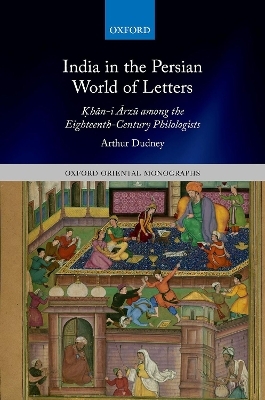
India in the Persian World of Letters
Oxford University Press (Verlag)
978-0-19-285741-5 (ISBN)
This is an open access title available under the terms of a CC BY-NC-ND 4.0 International licence. It is free to read at Oxford Scholarship Online and offered as a free PDF download from OUP and selected open access locations.
This book traces the development of philology (the study of literary language) in the Persian tradition in India, concentrating on its socio-political ramifications. The most influential Indo-Persian philologist of the eighteenth-century was Sirāj al-Dīn 'Alī Khān, (d. 1756), whose pen-name was Ārzū. Besides being a respected poet, Ārzū was a rigorous theoretician of language whose Intellectual legacy was side-lined by colonialism. His conception of language accounted for literary innovation and historical change in part to theorize the tāzah-go'ī [literally, "fresh-speaking"] movement in Persian literary culture. Although later scholarship has tended to frame this debate in anachronistically nationalist terms (Iranian native-speakers versus Indian imitators), the primary sources show that contemporary concerns had less to do with geography than with the question of how to assess innovative "fresh-speaking" poetry, a situation analogous to the Quarrel of the Ancients and the Moderns in early modern Europe. Ārzū used historical reasoning to argue that as a cosmopolitan language Persian could not be the property of one nation or be subject to one narrow kind of interpretation. Ārzū also shaped attitudes about reḳhtah, the Persianized form of vernacular poetry that would later be renamed and reconceptualized as Urdu, helping the vernacular to gain acceptance in elite literary circles in northern India. This study puts to rest the persistent misconception that Indians started writing the vernacular because they were ashamed of their poor grasp of Persian at the twilight of the Mughal Empire.
Arthur Dudney is Director of Cultural Programmes at the Arcadia Fund. He was formerly a Leverhulme Early Career fellow at the University of Cambridge and a Mellon Fellow at the University of Oxford. He received a PhD in Middle Eastern, South Asian & African Studies from Columbia University and an AB in Classics from Princeton University. He is a Fellow of the Royal Asiatic Society.
Acknowledgments
Abbreviations and Conventions
Introduction
1: A Literate Life: Placing =Arz=u and his Works in their Social Context
2: =Arz=u's Fruitful Theory of Language
3: Innovation and Poetic Authority in Eighteenth-Century Persian
4: Dictionaries Delimiting Literary Language
5: Building a Vernacular Culture on the Ruins of Persian
6: How Language Actually Works: Contrasting Europe and the Non-West
Conclusion
References
| Erscheinungsdatum | 21.07.2022 |
|---|---|
| Reihe/Serie | Oxford Oriental Monographs |
| Verlagsort | Oxford |
| Sprache | englisch |
| Maße | 145 x 224 mm |
| Gewicht | 518 g |
| Themenwelt | Literatur ► Lyrik / Dramatik ► Lyrik / Gedichte |
| Geisteswissenschaften ► Sprach- / Literaturwissenschaft ► Anglistik / Amerikanistik | |
| Geisteswissenschaften ► Sprach- / Literaturwissenschaft ► Literaturwissenschaft | |
| Geisteswissenschaften ► Sprach- / Literaturwissenschaft ► Sprachwissenschaft | |
| ISBN-10 | 0-19-285741-X / 019285741X |
| ISBN-13 | 978-0-19-285741-5 / 9780192857415 |
| Zustand | Neuware |
| Informationen gemäß Produktsicherheitsverordnung (GPSR) | |
| Haben Sie eine Frage zum Produkt? |
aus dem Bereich


